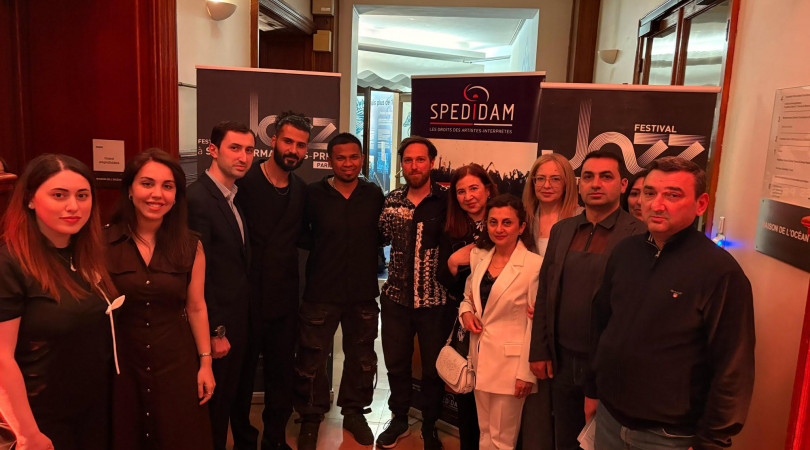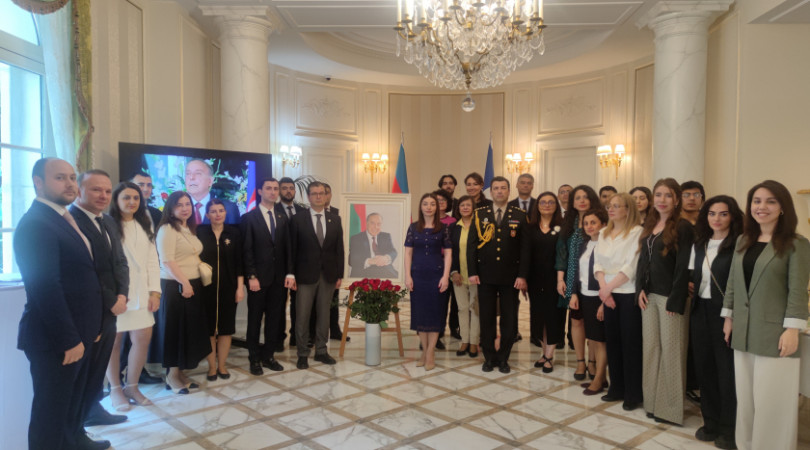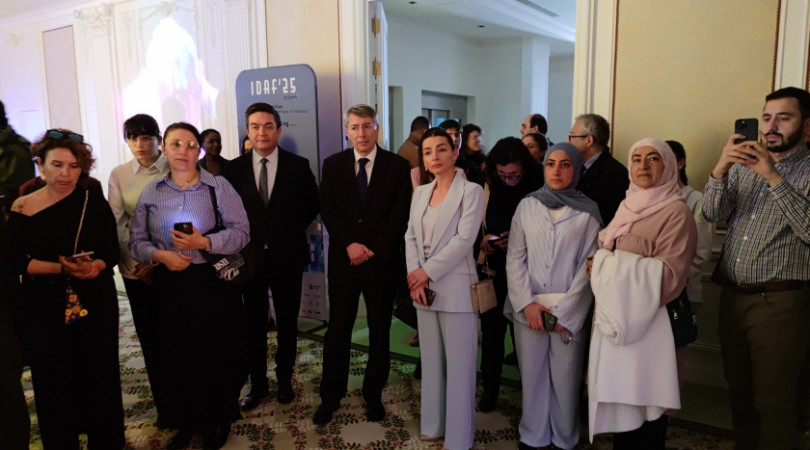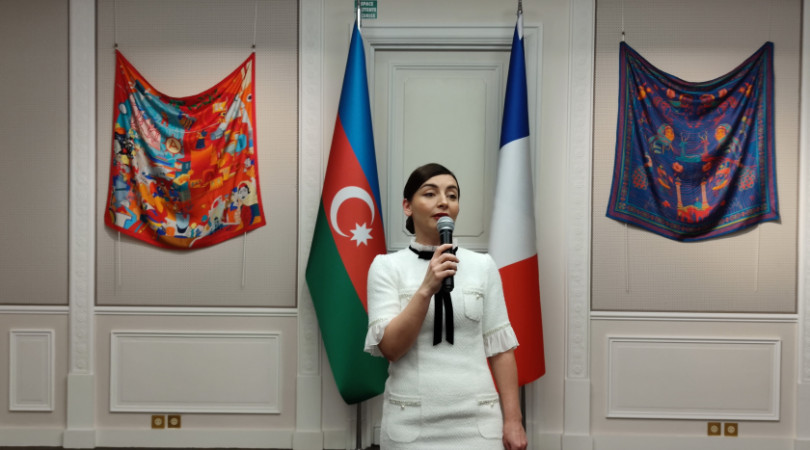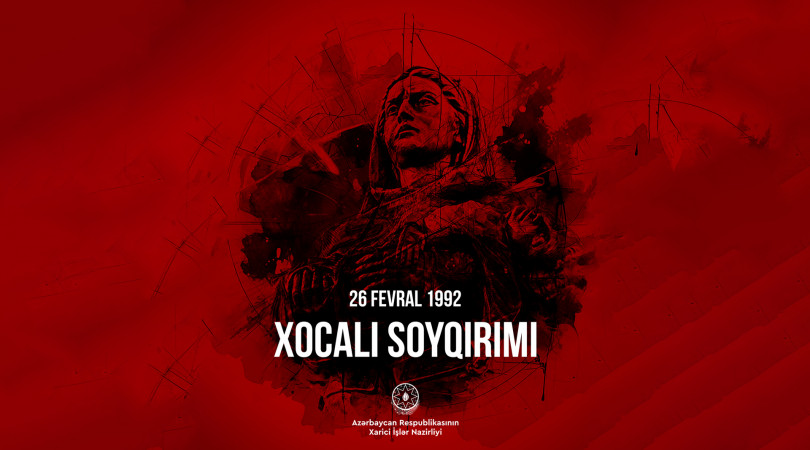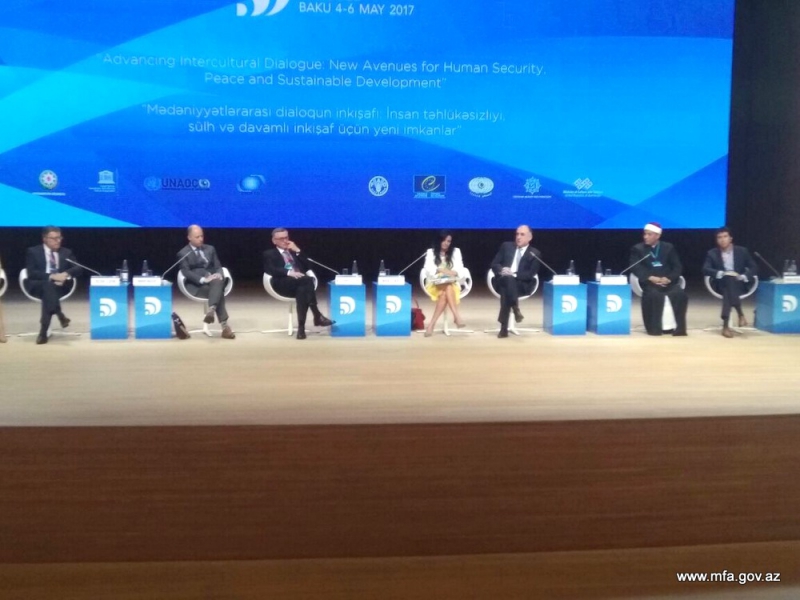Remarks by Elmar Mammadyarov, Minister of Foreign Affairs of the Republic of Azerbaijan at the 4th World Forum on Intercultural Dialogue
Remarks by Elmar Mammadyarov, Minister of Foreign Affairs of the Republic of Azerbaijan at the 4th World Forum on Intercultural Dialogue
Plenary Session 1:
Promoting Dialogue and Building Bridges as a Tool to Preventing Violent Extremism
Baku, May 5, 2017
Dear Mr. President
Distinguished guests,
Ladies and gentlemen,
In the contemporary world of growing intolerance, discrimination and violence based on religion or belief, intercultural and interreligious dialogue has become one of the most important tools in promoting tolerance, sustainable peace, stability and development. In this regard, I would like to particular highlight the important role the UN Alliance of Civilizations plays in fostering a global dialogue and cooperation for the promotion of tolerance, peace and better understanding across countries, cultures and civilizations.
We, in Azerbaijan, attach primary importance to the promotion of intercultural and interreligious dialogue at all levels. Multiculturalism and tolerance is a longstanding tradition in my country that strengthens and consolidates our society. We deem that the cultural diversity and multiculturalism are a strength and wealth that give an ample opportunity to contribute to the promotion of dialogue, encourage ethnic and religious pluralism, and thus to effectively prevent potential rise of violent extremism. It is not a coincidence that in Azerbaijan the year 2016 was proclaimed as “The Year of Multiculturalism” by a decree of the President of the Republic of Azerbaijan. The Government of Azerbaijan continues to pursue a consistent policy towards protection of the rights of all ethnic and religious minorities. More than one thousand mosques, eleven churches, six synagogues and other religious temples are functioning in Azerbaijan without any obstacles.
A year ago, here in Baku, we hosted the 7th Global Forum of the UN Alliance of Civilizations entitled “Living together in inclusive societies”. This important event was attended by more than 4,000 delegates from 147 countries, including Heads of states and governments, ministers, government officials, representatives of international organizations and mass media. The Forum’s themes reflected the 2030 Agenda for Sustainable Development, which incorporates the promotion of inclusive societies as pivotal component for sustainable development. The Baku Declaration adopted therein strongly condemned any advocacy of religious hatred that constitutes incitement to discrimination, hostility or violence and urged all Member States to unite against violent extremism in all its forms and manifestations. We do believe that Baku Declaration should serve as guidelines for states and international organizations in promotion of intercultural dialogue and multiculturalism as a way to counter violence, extremism and xenophobia. Recognising the special role of youth in the establishment and development of inclusive societies, the UN Alliance of Civilizations Youth Event was also held on the sidelines of the Forum with the participation of more than 150 young representatives of international community.
Dear friends,
In the past, Azerbaijan has experienced the horrors of terrorism and knows first hand how important is to fight this ugly phenomenon and eradicate its root causes. Terrorism is the act of vandalism and barbarity and poses direct threat to peace, security, stability and enjoyment of human rights. Azerbaijan condemns terrorism and violent extremism in all their forms and manifestations and has been actively collaborating with various international partners in the global fight against terrorism. We believe that in order to successfully counter this threat the consolidated efforts of all international community are needed. In this regard the role of the UN, in particular the Counter Terrorism Implementation Task Force in developing relevant cooperative programs aimed at enhancing political consensus and practical cooperation among Member States must be fully supported.
At the same time, I would like to particular emphasize the war on terrorism cannot and must not be used to target any religion or culture. Azerbaijan is alarmed by increased cases of religious intolerance, in particular Islamophobia, Anti-Semitism, xenophobia and attempts to associate religion with terrorism and violent extremism. We strongly condemn all attacks against Islam and reject any attempt to justify them under the pretext of freedom of expression. Further consolidation of the international efforts is required to stop the cultivation of hatred and false prejudices towards Islam and Muslims.
It is also vitally important not to wait until the terrorist act has happened and respond post-factum, but to prevent violent actions from occurring. Countering terrorism should contain preventive approach to increase the resilience of population. To this end, it is crucial to identify the conditions that are conducive to violent extremism. These conditions may differ and range from social marginalisation, unemployment, lack of education to religious radicalisation, polarisation and misconception. Various projects and initiatives on youth, education, sport, tourism, people-to-people contacts and media are very important in terms that they can, to a certain degree, help inoculate societies against extremism. To be short, but maybe in a simplified way, if a young man is well-educated, socially protected, has a job and perspectives in his life, he will be more resistant to various extremist recruitment narratives and radical ideologies. Thus, we fully support the 2030 Sustainable Development Agenda which strives to overcome the poverty, illiteracy, unemployment and social exclusion. Counter extremism narratives should be developed through the coordination and collaboration of governments, international organisations and civil societies, including religious communities and women organisations. Launching a global communications campaign by the one of the well-known international organizations aimed at promoting counter-narratives could be a useful step to that end.
Another important point which I would like to highlight is that prolonged and unresolved conflicts also form fertile grounds for violent extremism because such conflicts allow violent extremist groups to exploit the situations in order to seize territory, resources and control populations, as rightly mentioned in the UN Plan of Action to Prevent Violent Extremism presented by the UN Secretary General in December 2015. Resolving these conflicts will seriously undermine the basis of violent extremism and disarm its “spiritual” leaders and fellows. We are particularly concerned about the growing nexus between violent extremism and separatism. Violence and extremism fuelled by separatist ideologies manifest themselves especially in conflict and post-conflict situations create good conditions for terrorist organizations to recruit and win support.
We also acknowledge that promoting intercultural dialogue, tolerance and countering violent extremism have gained increased importance in the context of large movement of refugees and migrants. Azerbaijan has deep understanding of this problem given the fact that we have one million refugees and IDPs ethnically cleansed out of their homes. Enabling safe and dignified return of refugees and IDPs must be at the center of international efforts.
Dear friends,
I hope that our discussions will produce concrete results and streamline the required measures aimed at overcoming the stereotypes and misconceptions, hostility and hatred, on the one hand, and fostering peace, dialogue and mutual respect among peoples of different cultures and religions, on the other.
Thank you.

